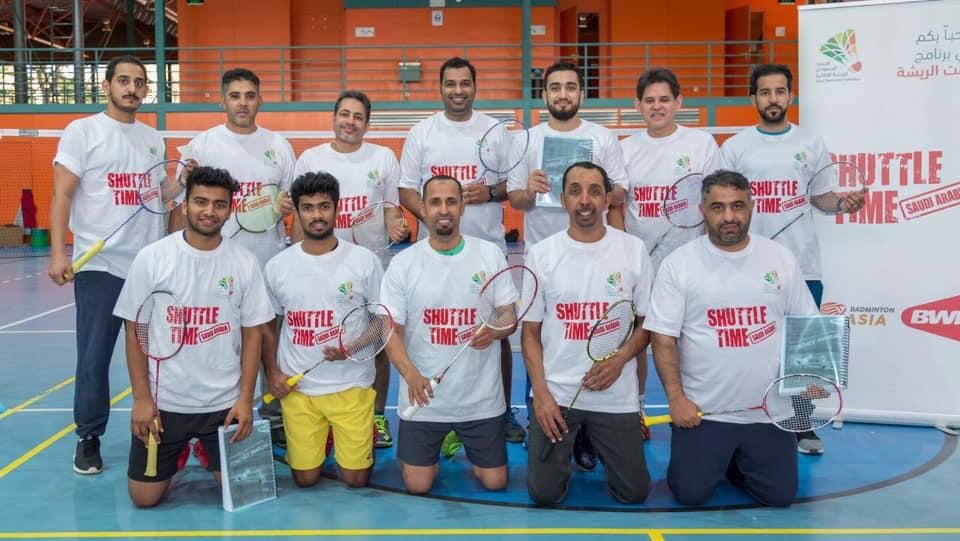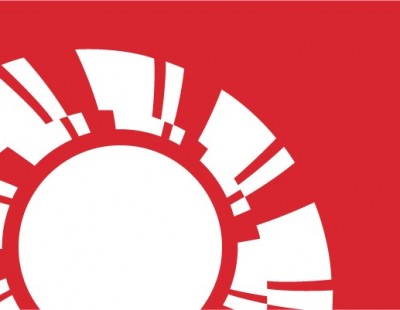This is the 32nd story in our Humans of Shuttle Time series, in which we present the perspectives of those who work on badminton development at the grassroots level. Ammar Awad, Shuttle Time National Coordinator of Saudi Badminton Federation, speaks of discovering badminton in his childhood and popularising the sport in Saudi Arabia.
Early Days
I’m from a family that loves sports. We are from Damascus, the capital of Syria. My three brothers play badminton and they did well in local tournaments.
As a child I was a good football player but I used to go with my brothers to play badminton. I turned into a good badminton player, and after consulting my family, decided to pursue this sport.
Memories
The first time I saw badminton was in a club near my house. I used to go there with my brothers and my friends from the same neighborhood.
I felt it was a nice game in which there was challenge and competition. It was fun for the practitioner and the spectator.

Participants at a Shuttle Time programme in Saudi Arabia.
At the age of 10, I started practising badminton seriously. I trained every day, and I was fortunate that all the players in the club were champions at the national level in Syria and this helped me develop quickly. I participated in many local tournaments and won many local championships in all age groups were chosen to represent the national team in 2004 and won gold medal in the Arab Championships in various competitions between 2007 and 2011. I also won medals at the international level.
Memorable Moment
The most beautiful feeling in badminton is standing on the podium and seeing the flag of your country. I was fortunate enough to play my favourite player Lin Dan at the 2011 Asian Championships in China.
Badminton has become a big part of everyday life. It’s a world that makes me happy while I practice, and I always crave to give my best.
Badminton is a safe game with few injuries; it is for all ages and for males and females. It has many benefits — physical, social, emotional and intellectual.
Developing Badminton
In the Kingdom of Saudi Arabia, badminton officially started in 2014, and in 2016 we started to activate development programmes that were introduced in the strategic plan of the federation. The most important of these was Shuttle Time, in cooperation with the Ministry of Education. The federation worked to spread the sport, through Shuttle Time, AirBadminton, Para badminton and Special Olympics. Badminton was introduced in clubs and as many as 52 clubs registered.
Impact of Shuttle Time
Shuttle Time is considered one of the most important programmes currently in the Kingdom. It has won the admiration of many teachers for its content, such as videos and lesson plans. We have made many gains, most notably in spreading the game in schools and the discovery of many teachers and players with talent.
Previous Stories in This Series
Humans of Shuttle Time: Carolin Ruth
Humans of Shuttle Time: Caroline Brial
Humans of Shuttle Time: Danny Ten
Humans of Shuttle Time: Mohlala Mopeli
Humans of Shuttle Time: Tatiana Petrova
Humans of Shuttle Time: Levente Nagy-Szabó
Humans of Shuttle Time: Kumon Tarawa
Humans of Shuttle Time: Didier Nourry
Humans of Shuttle Time: Joseph Devenecia
Humans of Shuttle Time: Su Ying Lau
Humans of Shuttle Time: Erin Walklate
Humans of Shuttle Time: Bukasa Mukoma Marcel
Humans of Shuttle Time: Luis Fernando Montilla
Humans of Shuttle Time: Artur Niyazov
Humans of Shuttle Time: Galkhuu Zulbaatar
Humans of Shuttle Time: Zuzana Rajdugova
Humans of Shuttle Time: Milan Barbir
Humans of Shuttle Time: Nargis Nabieva
Humans of Shuttle Time: Hannes Andersson
Humans of Shuttle Time: Merlie Tolentino
Humans of Shuttle Time: Nikhil Chandra Dhar
Humans of Shuttle Time: Geoffrey Shigoli
Humans of Shuttle Time: Erik Betancourt Luna
Humans of Shuttle Time: Richard Ssali Kaggwa
Humans of Shuttle Time: Azizbek Madjitov
Humans of Shuttle Time: Elie Jean
Humans of Shuttle Time: Danielle Whiteside
Humans of Shuttle Time: Oscar Alejandro Vera Suarez































